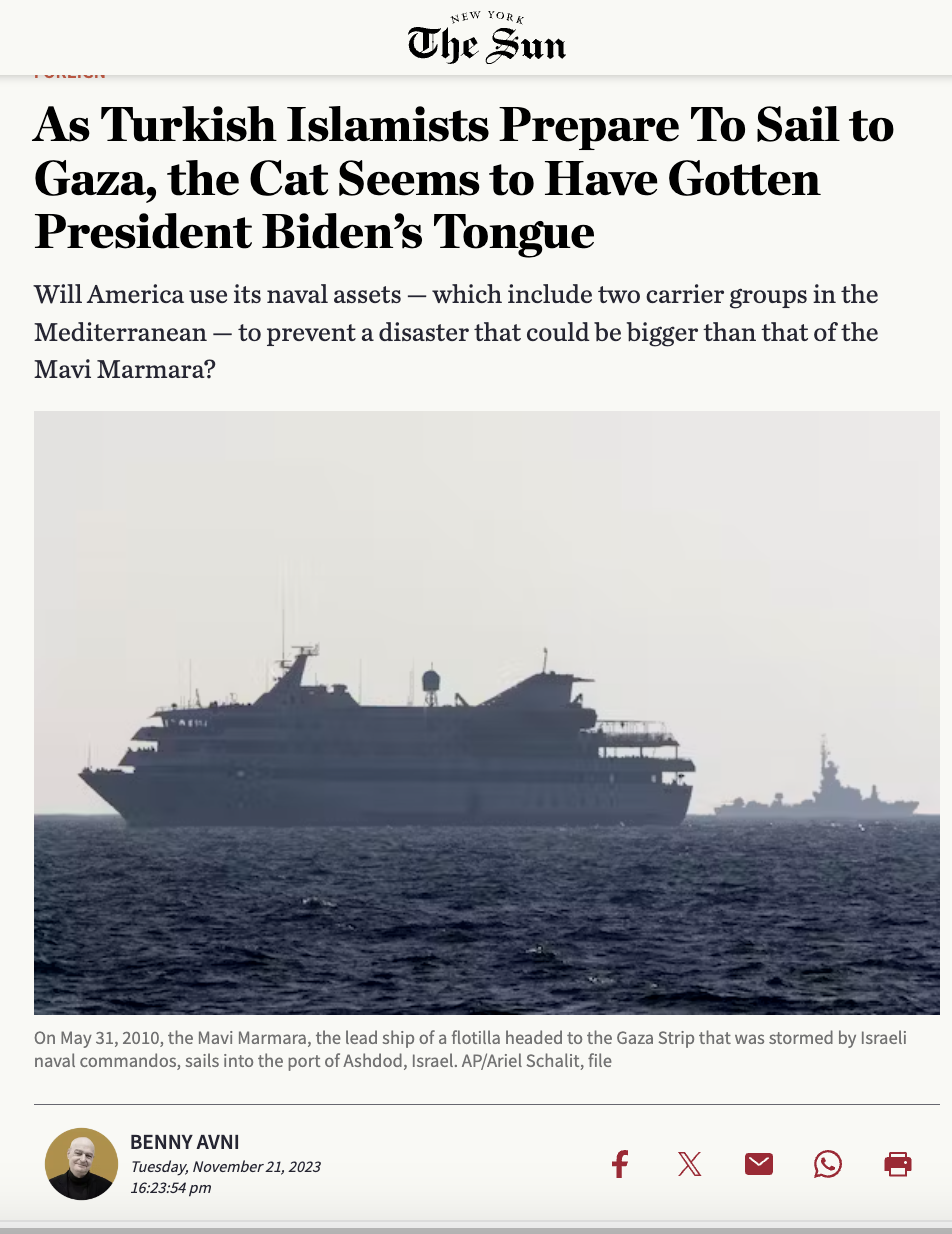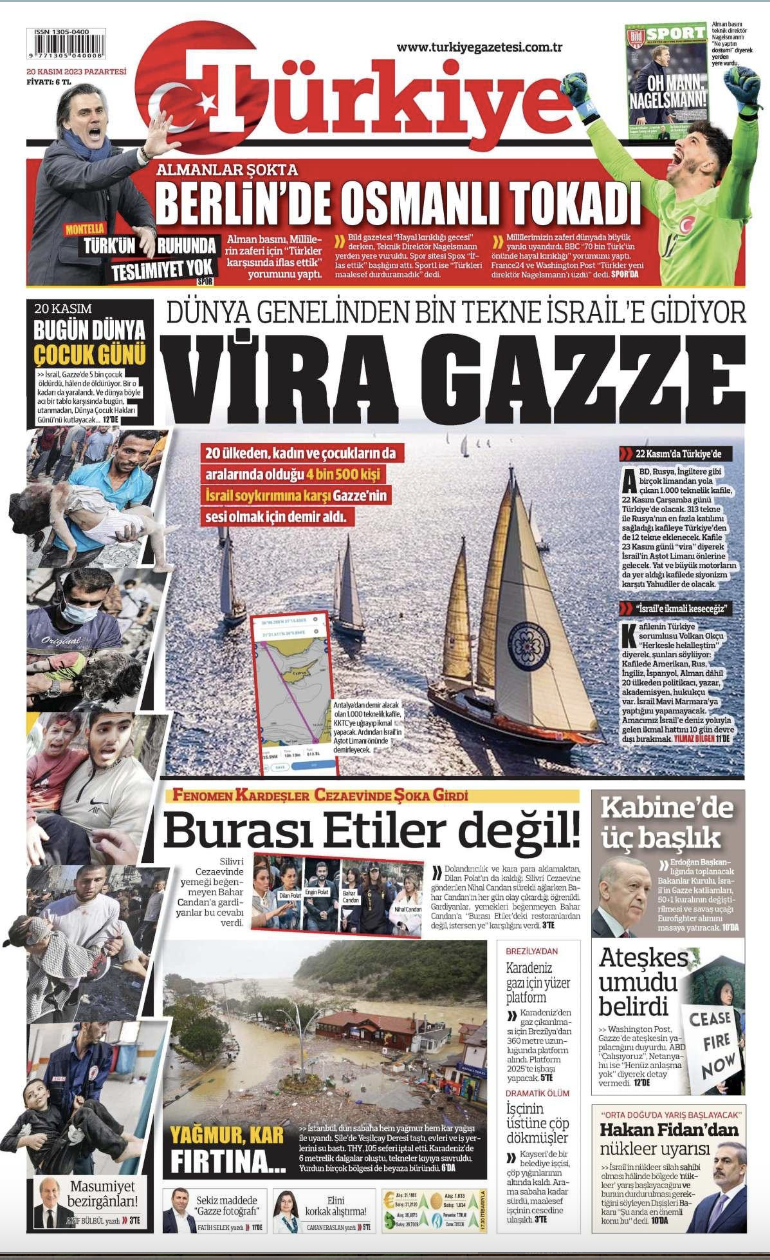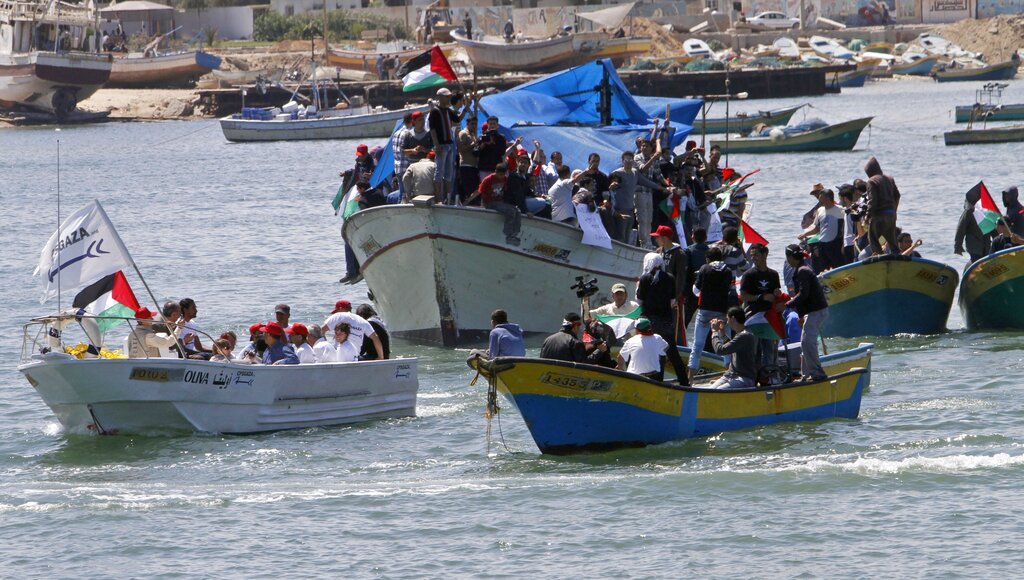Can you hide one thousand ships in the middle of the Mediterranean Sea? I would say not. But some of my fellow journalists seem to believe in magic.
"As Turkish Islamists Prepare To Sail to Gaza, the Cat Seems to Have Gotten President Biden’s Tongue", is the headline of an opinion column published on November 21st in the American online paper The New York Sun. "Will America use its naval assets—which include two carrier groups in the Mediterranean—to prevent a disaster that could be bigger than that of the Mavi Marmara?" asked the author, Benny Avni, a well-known opinion writer with stints in Newsweek and the Wall Street Journal. The Mavi Marmara, as we remember, was a ship chartered in 2010 by the Turkish charity IHH as the flagship of the "Gaza Freedom Flotilla," which tried to break the maritime blockade of Gaza and was assaulted in international waters by Israel's armed forces, who shot and killed ten activists, all of them Turkish. The incident led to a diplomatic rupture between Israel and Turkey.

And it could happen now again, fears Avni: "Mr. Biden is yet to publicly call on Mr. Erdogan to reverse course or to warn would-be flotilla participants to stay home," he laments. Because the danger this time is enormous, according to him, "up to 1,000 boats and ships will reportedly gather in Turkey tomorrow and start toward Gaza on Thursday. The flotilla will be manned by 4,500 people from 40 countries, 'including anti-Zionist Jews', the Turkish website Haber 7 reports, and 313 Russian and 104 Spanish vessels. Only 12 Turkish boats will join the flotilla."
When this skepticism is dropped and an unlikely story is published, just because there is a source that can reasonably be quoted, the danger of spreading fake news multiplies and will soon have a snowball effect.
Forget about the Russians, who might have just sneaked out of the Black Sea, but what about over one hundred ships leaving Spanish ports and sailing all over the Mediterranean towards Turkey without anybody ever noticing? Remember the extensive media coverage given to the ten ships attempting the Second Freedom Flotilla in 2011, with two vessels sustaining suspicious damage in Greek and Turkish ports, widely suspected to be sabotage by Israeli agents. But now, amid the heightened current attention to the war on Gaza, the absence of any news reports anywhere about one thousand ships, except for a Turkish online site, should raise suspicion.

I don't expect Mr. Avni to have read the Turkish site. Most probably, he just reproduced the summary offered on that same day by the Israeli newspaper The Times of Israel. But never mind—the text is completely correct. Haber 7, a popular news site owned by a company close to the AKP, the ruling party of Turkish President Erdogan, had published the report about the flotilla one day earlier. It was not their own work, though; they had copied it in its entirety from Türkiye newspaper, duly noting the source. Türkiye is a conservative nationalist paper with a daily circulation of about 100,000 copies, which makes it one of the five biggest Turkish dailies. It is owned by the influential Ihlas Holding, a conglomerate present in media, electronics, health, trade, and mining and known to have close ties to Erdogan and the AKP. And yes, the flotilla appeared on November 20, 2023, all over the front page of the paper, with a photo of many sailboats in what looked more like a regatta than a political initiative and was probably not meant to be taken as depicting the actual flotilla. The online version of the same article used instead a picture of a sailboat from the Danish Freedom Flotilla that sailed to Gaza in 2018. And yes, it told exactly the story picked up by Mr. Avni—nobody had gotten lost in translation. According to activist Volkan Okçu, interviewed by the paper, there was this flotilla of one thousand ships gathering in Turkey, and although he didn't say exactly where, he had precise numbers of the people onboard, the money spent by volunteers, the flags under which they were sailing—including the USA, UK, Luxembourg, Russia, Germany, Poland and Spain—and the route to be taken. He couldn't have just made that up, could he?
But it is more worrying that The Times of Israel, which is one of the most widely followed newspapers in Israel, with nine million readers a month and versions in five languages, reproduced the story, taking it at face value and without any indication that not only was this unlikely but outright impossible.
Well, he did. There is no flotilla.
Who is he, by the way? This is not easy to answer. Volkan Okçu has emerged in the last two years in several Turkish media outlets as a "businessman" concerned with social issues. His full name is said to be Sadri Volkan Okçuoglu, but his Twitter handle, @VolkanOkcuoglu, with 106.000 followers, was only created last April. The number of followers is not strange in Turkey, where many media activists have hundreds of thousands of followers, presumably most of them fake accounts. However, it seems that between 2020 and 2022, the same person went by the name of Baran Küçük, with an account that is now suspended, but using the same profile picture.

Volkan Okçu is probably a real individual, at least as depicted in a Sabah newspaper article from March 2023. However, there is little doubt that he is aligned with a broader array of media activists close to the AKP who are working to push a conservative and nationalist narrative. Some of these activists, often tweeting in Turkish, English, and Arabic, with hundreds of thousands of followers, have accounts whose real identities are unknown. Within the opposition circles, they are dubbed "AKP trolls," and this is in fact how several users of social networks describe "Volkan Okçu," too.
The fact that one of the largest newspapers in Turkey published a story that is not only completely made up but also immediately discernible as fake news by any reader who tries to imagine one thousand ships at sea is a very worrying sign for journalism in Turkey. Nonetheless, there is a glimmer of hope in the limited number of outlets that picked up the story—besides Haber 7, and some smaller local outlets, there was only TR Haber, run also by a journalist close to the AKP and the party's media activist network. But it is more worrying that The Times of Israel, which is one of the most widely followed newspapers in Israel, with nine million readers a month and versions in five languages, reproduced the story, taking it at face value and without any indication that not only was this unlikely but outright impossible.
The staff writer might have considered that quoting the Turkish newspaper and correctly attributing all data and every bit of information to his source is sound journalism. But it is not, far from it. From a purely technical viewpoint, he made no mistake—Turkiye (and also Haber 7) is in fact a mainstream outlet which should be expected to have reasonably correct standards and which can be quoted, and there was no translation or interpretation mistake. But the story in itself was not real. And this must be the first hurdle when considering any possible story, no matter how good the sources are: could it have happened? When the answer is "very unlikely," there is no excuse for reprinting a story without researching it very carefully first. The Times of Israel neglected this fundamental duty of journalism.
So did Middle East Monitor, an influential and often quoted media outlet on the other side of the political spectrum, with a somewhat shorter summary of the same story.
And so did Benny Avni, when calling on President Biden to have a talk with Erdogan. He actually did some research, or so he said, and came across an interesting bit of information: there is "a widely distributed Turkish-language poster calling for donations," with the headline “The International Freedom Fleet Coalition is setting out again for Gaza. Now is the time to support lifting the blockade and embargo and for the genocide to end."
This is correct. The poster is distributed by a Turkish organisation called "Mavi Marmara Association" and is now asking for donations "for the purchase of ships." Anybody reading it would conclude that whoever is organizing the flotilla still has no ship at hand, let alone a thousand. Logical reasoning and sound skepticism are part of a journalist's tools, too.
When this skepticism is dropped and an unlikely story is published, just because there is a source that can reasonably be quoted, the danger of spreading fake news multiplies and will soon have a snowball effect. Not everybody would immediately believe an outlet rather unknown outside Turkey, but after having been reproduced by several highly regarded international media, how can one still doubt it? So far, the flotilla has not made it to the big news agencies, but if it does tomorrow, the snowball will no longer be stoppable. And there will be one thousand ghost ships sailing across the Mediterranean without ever reaching land.
A writer of magic novels might delight at the idea. A journalist must not.



















![Palestinian journalists attempt to connect to the internet using their phones in Rafah on the southern Gaza Strip. [Said Khatib/AFP]](/sites/default/files/ajr/2025/34962UB-highres-1705225575%20Large.jpeg)




















